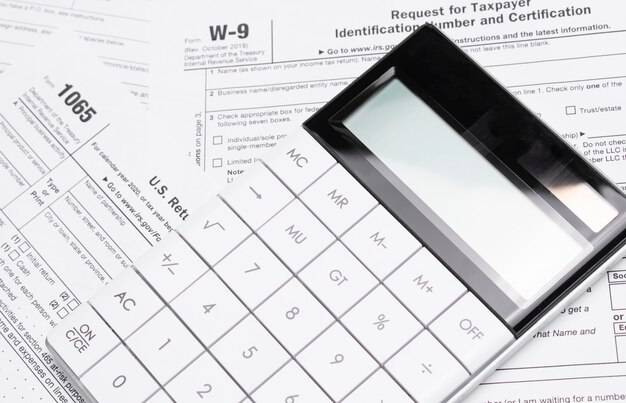New IRS Guidelines for Business Expenses in 2025: What You Need to Know

Anúncios
The IRS is implementing significant updates to business expense guidelines for 2025, impacting deductions for meals, home offices, and vehicle use, necessitating proactive review for compliance and optimal tax strategies.
Anúncios
Understanding what are the new IRS guidelines for claiming business expenses in 2025? is crucial for every business owner and independent contractor. As tax regulations evolve, staying informed isn’t just about compliance; it’s about optimizing your financial strategy and ensuring you leverage every legitimate deduction available. This comprehensive guide aims to demystify these forthcoming changes, offering clarity and actionable insights.
Navigating the Evolving Landscape of Business Expense Deductions
The Internal Revenue Service (IRS) continually refines its regulations to adapt to changing economic realities and policy objectives. For businesses, this means a perpetually shifting panorama of deductible expenses. The guidelines for 2025 are no exception, bringing a blend of clarifications to existing rules and notable adjustments in critical areas that will affect how businesses categorize and claim deductions.
Staying ahead of these changes isn’t merely about avoiding penalties; it’s a strategic imperative. Businesses that pro-actively understand and implement the new guidelines can optimize their tax burden, ensuring they retain more of their hard-earned revenue. Conversely, a lack of awareness can lead to missed opportunities or, worse, non-compliance issues that result in audits and financial repercussions.
Anúncios
Understanding General Principles of Deductibility
Before delving into specifics for 2025, it’s vital to revisit the core tenets of business expense deductibility. For an expense to be deductible, it must generally be both “ordinary” and “necessary.” An ordinary expense is common and accepted in your trade or business. A necessary expense is helpful and appropriate for your business. It doesn’t have to be indispensable to be considered necessary.
- 🔥 **Ordinary:** An expense that is common and accepted in your industry.
- 💼 **Necessary:** An expense that is helpful and appropriate for your business, not necessarily essential.
- 📚 **Substantiation:** The ability to prove the expense with adequate records, receipts, and documentation.
- 🕒 **Timeliness:** Expenses must be incurred within the tax year for which they are claimed.
These foundational principles remain steadfast, serving as the bedrock upon which all other specific rules are built. As the IRS introduces new provisions or alters existing ones, they are always viewed through the lens of these overarching requirements. Proper substantiation, for instance, remains paramount, regardless of which specific expense category is under review. Good record-keeping is your first line of defense and evidence.
The upcoming changes are largely a continuation of efforts to refine tax law, often influenced by post-pandemic economic shifts and policy goals aimed at stimulating certain business activities or curbing others. Businesses should approach these changes with a strategic mindset, not just a compliance one. This proactive stance ensures that every opportunity for legitimate deduction is identified and utilized, while simultaneously safeguarding against potential pitfalls related to misinterpretation or insufficient documentation.
Key Changes Affecting Business Meal and Entertainment Expenses
One of the areas that consistently sees updates and interpretations from the IRS is business meals and entertainment. For 2025, while some temporary provisions may expire, clarity and subtle shifts are emerging, particularly concerning the 100% deduction for certain restaurant meals that was a feature of recent years.
Businesses often grapple with the complexities of meal deductions, especially when intertwined with entertainment. Historically, entertainment expenses have been largely non-deductible, a rule solidified years ago. However, the line between an ordinary business meal and an entertainment expense can sometimes blur, requiring careful attention to the latest IRS guidance.
Meals Deduction: What’s New for 2025?
For 2025, the standard 50% deduction for business meals is expected to be the prevailing rule once again. The temporary 100% deduction for restaurant meals, introduced to support the restaurant industry during the pandemic, is not slated to continue. This means businesses will need to revert to the pre-2021 rules for most meal expenses.
- 🍽️ **50% Rule:** Most business meals will return to being 50% deductible.
- 🧾 **Documentation:** Maintain detailed receipts including date, amount, location, business purpose, and attendees.
- 🚫 **No Entertainment:** Meals must not be lavish or extravagant, and entertainment generally remains non-deductible.
It’s crucial for businesses to ensure that any meal claimed for deduction is directly related to the active conduct of their trade or business. The cost must not be lavish or extravagant, considering the circumstances. This implies a reasonableness standard that the IRS frequently emphasizes. Proper documentation is paramount; merely having a receipt isn’t enough. You need to record the purpose of the meal and the individuals present to justify its business relevance.
The IRS continues to scrutinize these deductions, making accurate record-keeping indispensable. Businesses should review their internal policies regarding meal expenses to align with the returning 50% deduction rule and ensure all employees authorized to incur such expenses are aware of the updated requirements for substantiation. This proactive approach helps prevent discrepancies during audits.
While the 100% deduction was a welcome relief for many, its sunset signals a return to more traditional tax treatment. This adjustment emphasizes the need for an ongoing understanding of what constitutes a legitimate business meal versus a personal expense or non-deductible entertainment. Training for employees who incur these expenses will be a smart investment for 2025 and beyond.
Home Office Deduction: Stricter Rules and Criteria
The rise of remote work has made the home office deduction more relevant than ever, yet the IRS maintains strict criteria for its claim. For 2025, while no drastic overhauls are anticipated for the self-employed, the emphasis remains heavily on the “exclusive and regular use” tests. The previously available simplified option also continues, offering a straightforward but potentially smaller deduction.
Employees generally cannot claim a home office deduction unless they are statutory employees or meet specific, very limited criteria under prior rules that largely ended with the Tax Cuts and Jobs Act (TCJA). The conversation around home office deductions for 2025 primarily revolves around self-employed individuals and independent contractors.

Meeting the “Exclusive and Regular Use” Test
For self-employed individuals, the home office must be used exclusively and regularly as your principal place of business. “Exclusive” means you use a specific area of your home only for your trade or business. “Regular” means you use the area on an ongoing basis. It cannot be used for any personal activities.
- 🏡 **Exclusive Use:** A clearly identifiable area used solely for business.
- 🗓️ **Regular Use:** The space must be used on an ongoing, consistent basis for business activities.
- 💼 **Principal Place of Business:** Your home office must be the main place where you conduct your business, or where you meet clients, patients, or customers.
- 💰 **Simplified Option:** An alternative deduction of $5 per square foot, up to 300 square feet ($1,500 maximum).
The IRS is particularly vigilant about the “exclusive” use criterion. Using a spare bedroom primarily as a guest room and only occasionally for business would not qualify. The area must be dedicated solely to business activities. This strict interpretation means that a corner of a living room, if also used for family activities, would likely fail the test.
The “principal place of business” test is also critical. If you have an outside office where you conduct most of your business, but use your home office for administrative tasks, it might still qualify if those administrative tasks are substantial and essential, and there is no other fixed location where you conduct substantial administrative duties. This nuance requires careful consideration.
For those opting for the simplified deduction calculation, while it eliminates the need to track actual expenses (like utilities, insurance, depreciation), it might result in a lower deduction than the actual expense method, especially for those with significant home office costs. Businesses should evaluate which method provides the most advantageous outcome based on their specific situation. Regardless of the method, meeting the IRS’s stringent criteria is non-negotiable for 2025.
Vehicle Expense Deductions: Mileage Rates and Actual Expenses
Vehicle expenses are another common area for business deductions. For 2025, the IRS will continue to offer two primary methods for claiming these costs: the standard mileage rate and the actual expense method. The standard mileage rates are updated annually, reflecting changes in the cost of operating a vehicle. Businesses need to monitor the release of new rates for 2025, typically announced towards the end of the preceding year.
Choosing between the standard mileage rate and the actual expense method depends on individual circumstances and often, which method yields a higher deduction. It’s not a one-size-fits-all decision, and proper record-keeping is critical for both approaches.
Standard Mileage Rate vs. Actual Expense Method
The standard mileage rate offers a straightforward way to calculate deductions. You multiply the business miles driven by a set rate. This rate covers fuel, oil, maintenance, depreciation, and insurance. The primary benefit is simplicity and reduced record-keeping, as you only need to track your business mileage accurately.
- 🚗 **Standard Mileage Rate:** Simpler, requires only mileage tracking.
- 💸 **Actual Expenses:** More complex, requires detailed records of all vehicle-related costs.
- 📝 **Record Keeping:** Essential for both methods to document business vs. personal use.
- 📅 **Annual Update:** Mileage rates are adjusted yearly; check for 2025 announcements.
The actual expense method requires meticulous record-keeping of all vehicle-related costs, including: fuel, oil, repairs, tires, insurance, license and registration fees, parking fees, tolls, and depreciation. While more burdensome, this method can sometimes lead to a larger deduction, particularly for vehicles with high operating costs or significant depreciation.
Crucially, businesses must maintain detailed logs of their vehicle use, regardless of the method chosen. This includes dates, mileage (beginning and end of trips), destinations, and the business purpose of each trip. Without this documentation, any claim for vehicle expenses is vulnerable during an audit.
For 2025, businesses should anticipate that the IRS will continue its focus on differentiating between business and personal use of vehicles. Commuting to a regular place of business is generally considered personal, for instance, even if it’s a long drive. Only mileage incurred specifically for business activities (e.g., traveling to client meetings, business conferences, or to perform services at different locations) is deductible.
It is advisable to compare both methods at the end of the tax year or consult with a tax professional to determine the most beneficial strategy. The decision often depends on the specific vehicle, annual mileage, and the proportion of business versus personal use.
Technology and Software Expenses: Navigating Modern Deductions
In today’s digital economy, technology and software are indispensable tools for almost every business. The IRS recognizes these as legitimate business expenses, provided they meet the ordinary and necessary criteria. For 2025, businesses should continue to ensure proper classification and amortization of these assets, especially for larger investments.
This category includes a wide array of items, from computers and specialized software to cloud subscriptions and cybersecurity tools. Understanding how to correctly deduct these can significantly impact a business’s taxable income.
Deductibility of Digital Tools and Services
Generally, expenses for computers, software, and other technological tools used solely for business purposes are fully deductible. Smaller purchases might be expensed immediately, while larger, long-term assets may need to be depreciated over several years. Section 179 deduction and bonus depreciation rules allow for accelerated deductions for eligible assets, offering immediate tax benefits.
- 💡 **Immediate Deduction:** Many smaller tech purchases can be expensed in the year of purchase.
- 🔗 **Depreciation:** Larger, longer-lasting assets may need to be depreciated over time.
- ☁️ **Cloud Services:** Subscription fees for business-related cloud software are generally deductible.
- 🔒 **Cybersecurity:** Expenses for securing business data are fully deductible as necessary costs.
For subscription-based software and cloud services, the payments are typically deductible in the year they are incurred. This includes popular tools for accounting, project management, customer relationship management (CRM), and industry-specific software. The key is that these services must be primarily used for legitimate business operations.
The IRS expects businesses to differentiate between personal and business use of technology. A personal laptop occasionally used for work might not qualify for a full deduction, whereas a computer purchased exclusively for business operations would. Adequate records, including purchase receipts and a clear demonstration of business use, are essential to substantiate these claims.
As technology rapidly evolves, so too does the need for businesses to invest in new tools. Keeping up-to-date with software licenses, hardware upgrades, and cybersecurity measures is not just about efficiency; it’s a necessary cost of doing business in 2025. Leveraging available deductions for these expenses can provide substantial tax relief, reinforcing the importance of accurate categorization and excellent record-keeping.
Professional Development and Education Deductions
Investing in professional development and education is a cornerstone of business growth and competitiveness. The IRS permits deductions for certain educational expenses, provided they enhance skills related to your existing business or employment. For 2025, the guiding principle remains that the education must maintain or improve skills required in your current trade or business, or be required by your employer or by law to keep your present salary, status, or job. It cannot qualify you for a new trade or business.
This category extends beyond formal university courses to include seminars, workshops, professional conferences, and even certain business-related publications and online courses. The focus is on the direct benefit to your current business activities.
Rules for Conferences, Seminars, and Online Courses
Expenses for attending business-related conferences and seminars are deductible. This often includes not only the registration fees but also related travel, meal (subject to 50% rule), and lodging expenses if away from home overnight. The primary purpose of the trip must be business; any personal elements must be incidental.
- 📈 **Skill Enhancement:** Education must maintain or improve current business skills.
- 🚫 **No New Career:** Cannot qualify you for a new trade or business.
- ✈️ **Travel Expenses:** Deductible if the primary purpose is business.
- 📖 **Resources:** Books, subscriptions, and online course fees are deductible if business-related.
Online courses and specialized certifications that directly relate to your business operations or professional expertise are also deductible. For instance, a graphic designer taking an advanced course in new design software, or a consultant attending a seminar on the latest industry regulations, would likely qualify for these deductions.
The IRS is particularly keen on the “new trade or business” criterion. If the education qualifies you for a completely new line of work, even if tangentially related, it is generally not deductible. For example, a marketing consultant taking a full-time law degree might not be able to deduct tuition if the intent is to become a lawyer, rather than to improve marketing skills.
Keep meticulous records of all professional development expenses. This includes registration confirmations, receipts for travel and accommodation, and clearly documented purposes for attending. For online courses, retain proof of purchase and course completion. These records are vital for substantiating the business relevance of the education expense to the IRS.
For 2025, businesses should view professional development as a strategic investment. Not only does it enhance capabilities, but many associated costs are legitimately deductible, further improving the financial health of the business.
Important Considerations for Small Businesses and Independent Contractors
For small businesses and independent contractors, navigating IRS guidelines on business expenses can be particularly challenging due to fewer resources compared to larger corporations. The guidelines for 2025 underscore the importance of meticulous record-keeping, understanding nuances, and potentially seeking professional advice.
Many self-employed individuals mix personal and business finances, making the clear delineation of expenses critical. The IRS pays close attention to these distinctions to prevent the deduction of personal expenses. Proactive organization and a clear understanding of what qualifies are essential for smooth tax filing.
Record Keeping and Audit Preparedness
The cornerstone of claiming any business expense is impeccable record-keeping. For 2025, the IRS will continue to emphasize the need for robust documentation for all deductions. This means more than just keeping receipts; it involves detailing the business purpose of each expense, who was involved, and when it occurred.
- 📋 **Detailed Records:** Keep all receipts, invoices, and bank statements for business expenses.
- 🎯 **Business Purpose:** Clearly document the “why” behind each expense (e.g., client meeting, supplies).
- 💾 **Digital Solutions:** Utilize accounting software or apps to streamline expense tracking.
- 🛡️ **Audit Defense:** Comprehensive records are your best defense in case of an IRS audit.
For small businesses and independent contractors, using dedicated business bank accounts and credit cards can simplify expense tracking significantly. Commingling personal and business funds makes it exceedingly difficult to accurately attribute expenses and can raise red flags during an audit. This separation also helps in clearly identifying income and expenditure flows.
Furthermore, regular review of expenses throughout the year, rather than just at tax time, can help identify any discrepancies or gaps in documentation. Cloud-based accounting software or expense tracking apps can automate much of this process, providing real-time insights and organized records that are easily accessible if the IRS requests them.
Understanding which expenses are fully deductible, partially deductible, or non-deductible is also paramount. For instance, while certain business gifts are deductible, they are subject to strict limits, and personal gifts are not. Distinguishing between a legitimate business lunch with a client and a personal meal with a friend is critical, as only the former (subject to the 50% rule) would be considered a business expense.
For 2025, the message for small businesses and independent contractors is clear: be diligent. The more organized and precise your records, the smoother your tax season will be, and the better prepared you will be to defend your deductions if questioned by the IRS. Consider a professional tax advisor if your business expenses are complex or substantial.
Anticipating Further IRS Guidance and Staying Compliant
The IRS continuously issues guidance in the form of publications, revenue rulings, and notices. While major legislative changes are less frequent, these smaller, yet significant, updates can greatly influence how businesses interpret and apply tax law. For 2025, businesses should remain vigilant for any additional clarifications or adjustments that the IRS may release throughout the year.
Compliance is an ongoing process, not a once-a-year event. An effective compliance strategy involves continuous learning and adaptation, especially in dynamic areas like business expense deductions. Relying on outdated information can lead to errors and potential penalties.

Resources for Staying Up-to-Date and Proactive Compliance
The primary source for all official IRS information is the IRS website (IRS.gov). This is where new publications, forms, and guidance are first released. Subscribing to IRS email updates or regularly checking their newsroom can provide timely notifications about relevant changes.
- 🌐 **IRS.gov:** The official source for all tax publications, forms, and updates.
- ✉️ **Email Subscriptions:** Sign up for IRS news releases and tax tips.
- 📊 **Professional Advice:** Consult with CPAs or tax attorneys for complex situations.
- 🔄 **Regular Review:** Periodically review your expense categorization and documentation processes.
Beyond official IRS channels, reputable tax news outlets, accounting associations, and professional tax advisors often provide valuable interpretations and summaries of new guidelines. These resources can help businesses understand the practical implications of technical IRS language.
Proactive compliance also involves internal education. Businesses should ensure that all staff authorized to incur expenses are aware of the latest rules for documentation and deductibility. Training sessions or clear internal guidelines can prevent errors before they become issues during tax filing.
For 2025, consider implementing or revising your company’s expense policies to explicitly reflect the updated IRS guidelines. This includes clear instructions on what is deductible, what documentation is required, and how expenses should be submitted. Such policies not only aid compliance but also streamline internal accounting processes.
Tax planning should not be a reactive measure taken only at year-end. Regular financial reviews, ideally quarterly, allow businesses to assess their expenses against the current and upcoming IRS guidelines. This ongoing process enables timely adjustments, minimizes surprises, and ultimately leads to a more efficient and compliant tax strategy for your business moving forward.
| Key Point | Brief Description |
|---|---|
| 🍽️ Meal Deduction | Returns to standard 50% deductibility, excluding temporary 100% rule. |
| 🏠 Home Office | Strict “exclusive and regular use” rule for self-employed; simplified option still available. |
| 🚗 Vehicle Expenses | Choose between annually updated standard mileage rates or detailed actual expenses. |
| 📝 Record Documentation | Crucial for all deductions; detail purpose, date, amount, and attendees. |
Frequently Asked Questions About 2025 IRS Business Expenses
No, entertainment expenses generally remain non-deductible for businesses in 2025. This rule has been in place since the Tax Cuts and Jobs Act of 2017. Businesses should be careful not to confuse entertainment with business meals, which can still be partially deductible if they meet specific criteria, such as being directly related to business discussions.
For 2025, the vast majority of business meals will return to being 50% deductible. The temporary 100% deduction for restaurant meals, introduced to support the restaurant industry during the pandemic, is not expected to continue. Always ensure the meal has a clear business purpose and is not lavish, while maintaining detailed records.
The “exclusive and regular use” test requires a specific area of your home to be used only for your business (exclusive) and on an ongoing basis (regular). This ensures the home office is a dedicated workspace, not a multipurpose room. Failure to meet both criteria can disqualify the home office deduction for self-employed individuals.
Yes, even if you use the standard mileage rate, you must keep accurate records of your business mileage. This includes the date of the trip, the destination, the business purpose, and the number of miles driven. Without proper mileage logs, the IRS may disallow your vehicle expense deduction in an audit.
Professional development courses are deductible if they maintain or improve skills needed in your current trade or business. However, they are not deductible if they qualify you for a new trade or business. For example, a business consultant taking a new certification related to their field would likely qualify, but training for a completely new career path would not.
Conclusion
The landscape of business expense deductions is a dynamic one, constantly shaped by IRS regulations. For 2025, understanding and adapting to these refined guidelines is paramount for effective financial management and tax compliance. Proactive engagement with the changes, meticulous record-keeping, and a clear distinction between business and personal expenses will empower businesses and independent contractors alike to maximize legitimate deductions while avoiding potential pitfalls. Staying informed through official IRS channels and professional advice is not just a best practice; it’s a strategic necessity in navigating the complexities of tax law, ensuring your business is fiscally sound and compliant for the year ahead.





